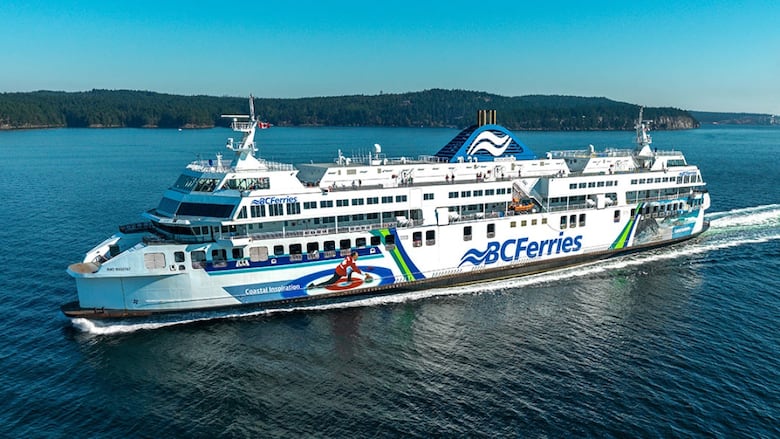Premier calls for 'fair treatment' for ferry users in B.C. after Ottawa cuts fares in Eastern Canada
Eby says East Coast ferries get $300 of federal support for every $1 B.C. Ferries receives per user

Premier David Eby is calling on Ottawa to increase the federal subsidy for ferry users in B.C. after Prime Minister Mark Carney followed through on a promise to lower ferry fares in Eastern Canada.
Eby said Monday that the federal government subsidizes ferry users on the East Coast by about $300 per person, while ferry users in B.C. receive $1 per person, and said provinces should receive the same per-capita funding, regardless of the program.
The premier said Ottawa must up the federal subsidy for B.C. ferry users, which has not changed for almost two decades.
"We're going to need the federal government to have a serious look at their policy in relation to ferry users in British Columbia and ensure fair treatment for ferry users here," Eby said.
Effective Aug. 1, fares for passengers, cars and commercial traffic on ferry services in Eastern Canada that are federally supported will go down by 50 per cent.
Fares for passengers and vehicles on the ferry that operates between Nova Scotia and Newfoundland and Labrador are also going down. Ottawa has pledged to increase funding to the operator — Marine Atlantic, a federal Crown corporation — to lower the price by 50 per cent. Ottawa is also freezing commercial freight rates on that route.
The lower fares come as B.C. Ferries faces criticism for its decision to hire China Merchants Industry Weihai Shipyards to build four new ships, following a five-year procurement process that didn't see any Canadian bidders.
Canada's transport minister, Chrystia Freeland, has said she's disappointed with the decision, while the Conservatives, both federally and in B.C., have gone further, saying the deal should be scrapped entirely.
The House of Commons transport committee agreed to launch a study into the $1-billion loan B.C. Ferries received from the Canada Infrastructure Bank to finance the purchase of the new electric-diesel ships from the Chinese shipbuilder.
Eby has said he would urge the committee to broaden its inquiry to look at how unfairly B.C. users are treated compared with Atlantic ferry users.
"So, I would encourage the federal committee to have a look at the differential treatment of the coasts in terms of ferry support. And I think going forward, there is a huge opportunity for us to work with the federal government to ensure that our shipbuilding industry has the opportunity to build these ferries right here in Canada."
In a statement to The Canadian Press, B.C. Ferries said it operates "one of the largest and most complex ferry systems in the world, and unlike many other jurisdictions, the vast majority of system costs are paid directly by ferry users."
"Without additional support, fares would need to increase by more than 30 per cent in 2028 alone, just to keep up with operating and capital pressures," it added.
Serge Buy, CEO of the Canadian Ferry Association, told CBC News that Ottawa's relationship with B.C. Ferries, a private company owned by the B.C. government, and Marine Atlantic is different, as the federal government has a constitutional obligation to support freight and passenger ferry service that connects Nova Scotia with Newfoundland and Labrador.
The federal government also subsidizes ferries in the Maritimes through the Ferry Services Contribution Program, which began in 1941 to help fund three key interprovincial ferry routes in Atlantic Canada and Eastern Québec.
Ottawa's funding for B.C. Ferries was negotiated by former premier Bill Bennett in 1977.
"While I certainly hope that more money would be available, I wouldn't call it an unfair proposition," he said. "It's simply moving money where the federal government has some key responsibilities."
In a statement, Freeland's office said that "when it comes to the operating costs, funding is focused on constitutionally mandated and interprovincial ferry services."
Corrections
- An earlier version of this story incorrectly said Ottawa agreed to subsidize Atlantic Canada's ferry services when those provinces joined Confederation. In fact, the agreement only applied to ferry service between Nova Scotia and Newfoundland and Labrador.Jul 28, 2025 11:30 PM EDT
With files from Katie DeRosa, Alex MacIsaac and The Canadian Press